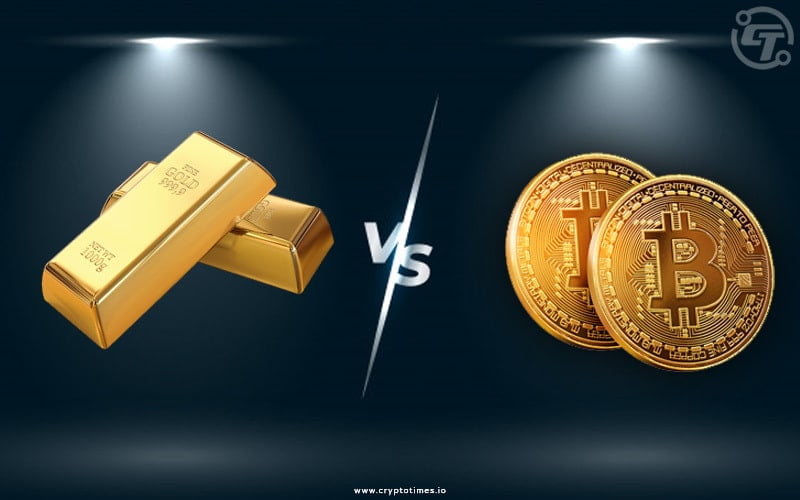2022 may be remembered as the year when in a battle of bitcoin vs gold, the gleaming yellow metal lost its luster to software!
Lockdowns sped up the adoption of all digital technologies, including communication, entertainment, and commerce. It also altered the system of how surplus capital could be used. Millions of retail investors and large institutions tested the waters in the cryptocurrency market.
Is Bitcoin really what crypto enthusiasts envision it as – “digital gold”?
For many centuries, gold has dominated the financial market with a firm grip. Investors consider it a safe haven for good returns. And if we talk about bitcoin, it was launched just over a decade ago and has only achieved widespread recognition in the last few years.
According to 8marketcap, gold has a market cap of $12.003 trillion. On the other side, Bitcoin has a market cap of $756.74 billion. It did reach $1 trillion but stayed there for only a short period.
In contrast, the total market value of all cryptocurrencies now exceeds $1.78 trillion, a staggering amount for virtual objects that are nothing more than computer code.
Bitcoin vs Gold is a fight for supremacy as one of the best investment opportunities in the digital age.
It is worthwhile to mention a similarity between Bitcoin and Gold. Other than being a hedge against inflation, they are considered a store of value as well. Let’s explore that for a bit.
Bitcoin Vs Gold: Store of Value
Currency is useful if it functions as a store of value, or if its relative value can be reliably maintained over time. Many societies throughout history used commodities or precious metals as payment methods because they were thought to have a relatively stable value.
While the relative value of such “currencies” fluctuates over time, they can be relied on to retain some value in almost any scenario. This is especially true if the store of value has a limited supply.
Gold is a finite resource, and there will eventually come a stage when there is none left to be mined. Similarly, Bitcoin’s scarcity is its primary source of value. The last bitcoin is expected to be mined in the year 2140, to a maximum of 21 million coins.
You may be wondering which is a better value store. Among the many long-term and short-term investment opportunities, which one stands out as a strong contender for a place in one’s portfolio?
According to a Nasdaq survey, many institutional investors and advisors see Bitcoin as a diversifier, want to try their hand at crypto investments, and have no plans to forsake the asset class.
But, the gold camp cites the metal’s long history and is not as volatile as Bitcoin. Well, shall we have a look at the differences in the crusade of Bitcoin vs Gold now?
Differences – Bitcoin Vs Gold
1. Comparison of Nature
Gold did establish a system for trading, weighing, and tracking. It was difficult to steal it, pass it off as fake gold, or otherwise taint the metal.
However, the yellow metal isn’t easily divisible on the spot. Try taking a gold bar out to a restaurant and slicing off a small chunk to pay for the bill. Ridiculous and impractical, isn’t it?
This also leads us to believe that Bitcoin is superior to Gold with regard to the medium of exchange or a form of payment.
Bitcoin is highly divisible because you can transact with a fraction of a Bitcoin, and the system currently allows for 8 decimal digits. As a result, you can own as little as 0.00000001 BTC (or 1 satoshi).
The current value of Bitcoin is $39152.90, so 1 BTC would cost you $0.0003907912.
Gold also poses potential issues with purity and verification. While if we talk about Bitcoin, the public nature of the blockchain and the system of confirming transactions by consensus allow for bitcoins to be verified during transactions and prohibit users from spending the same bitcoin twice.
More importantly, the size of the Bitcoin network makes “double-spending” unlikely. Bitcoin is almost impossible to corrupt, thanks to its cryptographic encryption, decentralized system, and complicated algorithms.
To accomplish a transaction with counterfeit Bitcoins, a 51% takeover of the network is required. It’s a near-impossible feat to achieve!
Therefore, in terms of transparency during a Bitcoin vs Gold battle, the former leads every other form of payment.
“If you don’t understand bitcoin, you don’t understand money.”
-CZ, Founder & CEO, Binance
2. Centralization vs Decentralization
Gold is heavily regulated by various governments and their policies. However, due to the fact that it is not created by a government, Bitcoin is the world’s oldest and most well-known decentralized virtual currency.
The largest gold reserves are held by central banks around the world, and they are responsible for limiting the physical supply of gold, which has a direct impact on the gold price.
In comparison, Bitcoins are not controlled by any single party and, unlike traditional currencies, do not have their own central bank. This means that the price of gold is determined in the same way that the price of stocks is determined.
In terms of regulations, regulatory bodies’ reactions to Bitcoins have shifted over time. It lacks the support of government authorities, as well as a system of intermediary banks to spread its use.
Not only does the cryptocurrency lack the benefits of a currency such as a dollar, yen, or euro due to the uncertain regulatory environment, but it also faces acceptance challenges in areas such as taxation, accounting, and anti-money laundering.
“Gold and silver is money, everything else is credit.”
– J.P. Morgan
3. Applications Create Value
Initially, gold was used to support the value of fiat currencies. Fiats are now nothing more than pieces of paper with no intrinsic value.
A person holding a piece of gold may have no immediate physical value; they cannot, for example, eat or drink it. But, by converting gold into coins for use in a system of exchange for goods, that coin will gain value immediately.
Gold has been continually used in many applications, from luxury items like jewelry to specialized applications in dentistry, electronics, and more.
Another use of gold is as an inflation hedge, a defensive investment. People buy gold to hedge against a stock market downturn or currency risk.
Bitcoin itself has tremendous baseline value as well. The first thing is the blockchain technology it is backed by.
Billions of people around the world lack access to banking infrastructure and traditional means of finance like credit.
With bitcoin, these individuals can send value across the globe for close to no fee. Bitcoin’s true potential as a means of banking for those without access to traditional banks has perhaps yet to be fully developed.
Scarcity nurtures rarity. While there is a limited supply of gold on Earth, its digital counterpart is even more scarce. Every four years, the number of new bitcoins entering the market is roughly halved (every 210,000 blocks).
The Bitcoin halving also effectively prevents inflation. As a result of such future halvings, the “Bitcoin vs Gold: Scarcity Edition” will widen even more in Bitcoin’s favor.
“Bitcoin is the solution to the inflation caused by expansive government policies.”
-Michael Saylor, Co-founder, MicroStrategy
4. Bitcoin Has Yet to Prove its Worth as a Safe Haven: Liquidity
Liquidity refers to how easily you can obtain cash in exchange for an asset. If the asset is liquid, the trader can complete transactions quickly and at a low cost.
“The crypto investor of 2017 was driven by FOMO,” said Sharan Nair, the Chief Business Officer of crypto exchange CoinSwitch Kuber.
People all over the world believe that when other assets fail to provide stability, they should turn to gold. However, according to JPMorgan analysts, during difficult times in the world, the crypto environment has proven to be quite stable, with liquidity on large crypto exchanges remaining stable, unlike traditional markets.
Gold has historically proven to be a safe haven investment, keeping or growing in value even during economic or political turmoil. Bitcoin is also regarded as a safe haven. However, it is put to the test in practice, owing to the ongoing tensions between Russia and Ukraine.
Bitcoin has been subjected to an economic crisis during these trying times in Ukraine. However, the volatility of trading volumes does not support the argument that bitcoin is yet a safe haven.
5. Bitcoin Has Yet to Prove its Worth as a Safe Haven: Volatility
A currency’s adoption for day-to-day use likely depends on price stability, which consumers and businesses need when planning consumption and savings decisions.
Volatility is the polar opposite of stability. It both frightens and attracts people. It is a major concern for investors looking to bitcoin as a haven asset for market downing. For evidence, one only needs to look at the price history of bitcoin over the last two years.
In contrast, there are active buyers and sellers of gold at any given time. Refiners, dealers, banks, and individuals are all included.
Prices of Bitcoin have gone through multiple cycles of attention-driven boom and bust.
As per a report by Bloomberg, since May 2013 Bitcoin’s value has surged by more than 24,400%. During the same time, the price of an ounce of gold increased by just 25%.
To be fair, Bitcoin is extremely volatile and is a much more difficult asset to own for your peace of mind.
However, as Bitcoin’s popularity and liquidity grows, the likelihood of such sudden jumps diminishes, because more and more orders for large amounts appear on the market, making it much more difficult to break them on one’s own.
Therefore, in the closing of the Bitcoin vs Gold argument, digital gold is regarded as a high-risk asset for now due to its high volatility.
Final Words:
It’s no coincidence that bitcoin’s symbol and representative image incorporate elements of the dollar sign and a gold coin.
Nakamoto published a 500-word essay saying, “The root problem with conventional currency is all the trust that’s required to make it work. The central bank must be trusted not to debase the currency, but the history of fiat currencies is full of breaches of that trust. Strong encryption became available to the masses, and trust was no longer required,” the essay read further.
Rather than perceiving Bitcoin and Gold as completely opposite assets, we can complement both in a portfolio. In some cases, gold is superior to Bitcoin, while in others, Bitcoin is superior to gold.
Someone who invests their entire net worth in physical gold will most likely be able to sleep tension free at night citing the volatility of the crypto market. However, Bitcoin’s long-term performance speaks for itself and it is becoming strikingly clear that crypto is becoming a better place to park your money in today’s times.
The true significance of Bitcoin may be found in its example. Bitcoin has shown that payment systems based on open cryptographic networks and decentralized trust can be implemented in practice.







